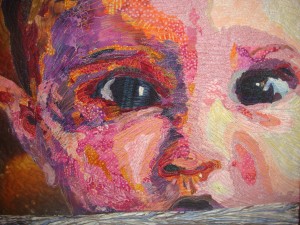[Reviewed by Marla Porter]
A Dreamer in Egypt – The Poetry of Jaylan Salman
“If only I was not a virgin, / I’d shag the sphinx, twist & turn its lower body with force of a hundred bloody veins,” ring the words of Jaylan Salman, a young poetess from Egypt in her poem When Dreams are Just Paperwork. Her poems, which are featured mostly on her Facebook page, have a strong feminine voice, clawing for independence and freedom in the presence of a strong family presence. Her longer poems set up narratives and dreamscapes, showing a strong longing for a reality beyond the mundane.
As a poet, Salman falls into one of the pitfalls of a young poet, allowing clichés to creep into her work. This is especially apparent in her rhymed poems, such as Death on the Concrete Land, where rhymed pairs hand/land, see/me, pain/rain and belonged/longed pop up. Grabbing these overdone rhymes makes the poem read as juvenile and distracts the reader from following the poem’s story.
Some of her work also has a pedestrian quality, such as her poem Tears on her Guitar, “She plays the guitar /Her father talks about the tragedies of the world / She keeps playing /Her tears fall leaving burning marks in the mocha colored wood / Her father just keeps talking.” A greater variation of syntax and more surprises for the reader could push this poem, with its background in the news and the Arab Spring, to a very interesting place. Salman focuses on a young girl, stuck with her family to observe the changes and struggles of the world. If the poem moved further into the girl’s inner world or into a stranger description of daily life, it could have been a moving piece. Salman struggles to develop the kind of complexity of voice that is associated with a mature poet. She should push herself to explore the issues of her contemporary life from multiple angles in the same poem, and to ask questions she can’t answer.
Although Salman has not produced a compelling body of work to launch her onto the international poetry scene, I can see a kernel of a real poet in her work. Some of her imagery is incredibly fresh, albeit surrounded with other, less-surprising lines. A great example of this occurs in her poem Pavane pour une infante défunte, “No roses blossom, no birds chirp, no fertile women to plant their babies in the fields of Sodom / She watches as her people stare / She relishes the flare from the crocodiles, floating in the Nile /She throws her spears at ancestors and creepy crows looming in the sky / Silence…” Here, the overdone image of roses and birds is followed by babies being planted in Sodom’s fields; her best images can be lost because she doesn’t restrain those that aren’t new. Whenever she allows local color into her work, she is most successful at creating a memorable poem. Jaylan Salman, while not yet a strong poet, is someone to watch for as her voice and work matures.
You can contact the reviewer, Marla Porter, at feverorforgottenwings@gmail.com.

